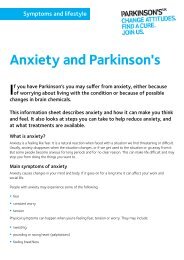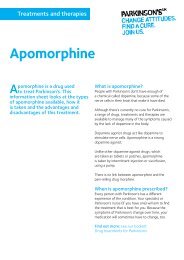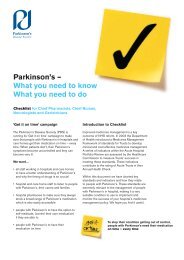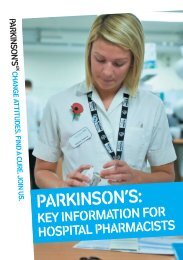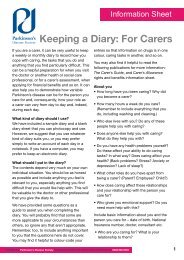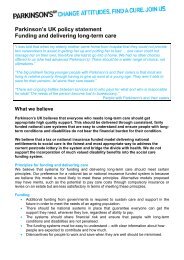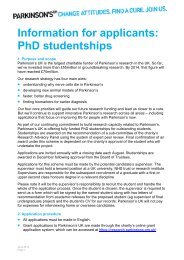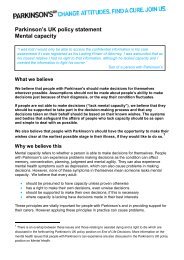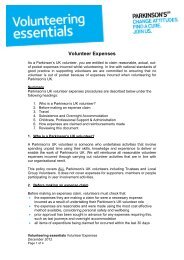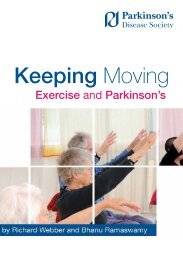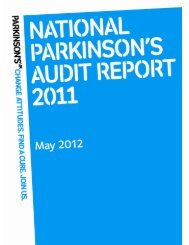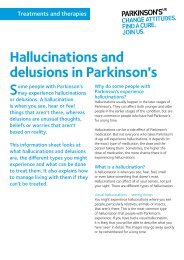Low blood pressure and Parkinson's - Parkinson's UK
Low blood pressure and Parkinson's - Parkinson's UK
Low blood pressure and Parkinson's - Parkinson's UK
You also want an ePaper? Increase the reach of your titles
YUMPU automatically turns print PDFs into web optimized ePapers that Google loves.
Symptoms <strong>and</strong> lifestyle<br />
<strong>Low</strong> <strong>blood</strong> <strong>pressure</strong><br />
<strong>and</strong> <strong>Parkinson's</strong><br />
Some people with Parkinson’s may experience problems with low<br />
<strong>blood</strong> <strong>pressure</strong> (this is called hypotension). It can be a symptom<br />
of Parkinson’s, or it can be a side effect of the drugs used to treat the<br />
condition. It may also be connected to another health condition that<br />
you have.<br />
This information sheet provides you with the facts about low <strong>blood</strong><br />
<strong>pressure</strong> in Parkinson’s <strong>and</strong> how to manage it.<br />
What is <strong>blood</strong> <strong>pressure</strong>?<br />
Your heart beats to pump <strong>blood</strong> around your body. One of the functions of <strong>blood</strong> is to carry oxygen from the<br />
lungs to your other organs, including your brain. Blood <strong>pressure</strong> is a measure of how forcefully your heart is<br />
pumping <strong>blood</strong> around your body.<br />
How is <strong>blood</strong> <strong>pressure</strong> controlled?<br />
Blood <strong>pressure</strong> goes up <strong>and</strong> down naturally during the day. It will go up if you are stressed or doing physical<br />
activity, <strong>and</strong> go down when you are resting.<br />
Within your main neck artery there are sensors that monitor <strong>and</strong> report the <strong>pressure</strong> of the <strong>blood</strong> to the<br />
brain. This is part of the autonomic nervous system.<br />
The autonomic nervous system includes the brain, nerves <strong>and</strong> spinal cord. It regulates a number of automatic<br />
functions, including your heartbeat, <strong>and</strong> maintains your <strong>blood</strong> <strong>pressure</strong>. The brain monitors the <strong>blood</strong> <strong>pressure</strong><br />
<strong>and</strong> sends messages to the heart to adjust it as needed.<br />
During certain activities, some parts of the body need more oxygen than others. For example, during exercise<br />
your muscles will need more oxygen. And, while you are eating, your stomach <strong>and</strong> intestines will need more.<br />
As there is only a certain amount of <strong>blood</strong> in the body, the supply of the <strong>blood</strong> has to be cleverly managed.
The autonomic nervous system reduces the <strong>blood</strong><br />
supply in some parts of the body to send, or divert,<br />
it to the parts that need it most.<br />
Your body also senses when you st<strong>and</strong> up <strong>and</strong> prevents<br />
gravity pooling the <strong>blood</strong> in your legs by increasing your<br />
heart rate <strong>and</strong> squeezing or contracting your <strong>blood</strong><br />
vessels, to move it around your body. However, if <strong>blood</strong><br />
does pool in your veins, less <strong>blood</strong> returns to the heart<br />
so the amount of <strong>blood</strong> reaching the brain is reduced.<br />
This can cause dizziness or fainting. It is called postural<br />
hypotension <strong>and</strong> can be a problem for people with Parkinson’s.<br />
How is <strong>blood</strong> <strong>pressure</strong> measured?<br />
Blood <strong>pressure</strong> is measured by listening to your heartbeat. Two readings are taken from each beat.<br />
The first reading is the force at which your heart is pumping the <strong>blood</strong> around your body (systolic) <strong>and</strong> the<br />
second is the level of <strong>pressure</strong> when your heart is resting (diastolic). By taking the two readings, you are<br />
getting a maximum <strong>and</strong> minimum <strong>blood</strong> <strong>pressure</strong>.<br />
The readings are given as two numbers, for example 120/70. A normal <strong>blood</strong> <strong>pressure</strong> reading is one<br />
between 90/60 <strong>and</strong> 140/90. Outside of this range it is classed as high or low.<br />
High <strong>blood</strong> <strong>pressure</strong><br />
High <strong>blood</strong> <strong>pressure</strong> is a reading of over 140/90. It means your heart is pumping the <strong>blood</strong> so forcefully that<br />
it could put a strain on your <strong>blood</strong> vessels <strong>and</strong> organs.<br />
High <strong>blood</strong> <strong>pressure</strong> can increase the risk of conditions such as heart failure <strong>and</strong> stroke. You are more likely<br />
to have high <strong>blood</strong> <strong>pressure</strong> if you are overweight, eat a poor diet or smoke. Your risk also increases if you have<br />
a family history or take some medications. There is no evidence that Parkinson’s causes high <strong>blood</strong> <strong>pressure</strong>.<br />
<strong>Low</strong> <strong>blood</strong> <strong>pressure</strong><br />
<strong>Low</strong> <strong>blood</strong> <strong>pressure</strong> is seen as a reading of below 90/60. Generally, the lower <strong>blood</strong> <strong>pressure</strong> you have, the<br />
better as naturally-low <strong>blood</strong> <strong>pressure</strong> doesn’t have any symptoms. However, if it drops too low you may<br />
experience symptoms so it might need to be treated.<br />
Common symptoms of low <strong>blood</strong> <strong>pressure</strong> include:<br />
••<br />
feeling dizzy or light-headed<br />
••<br />
blurred vision<br />
••<br />
feeling weak<br />
••<br />
tiredness<br />
••<br />
feeling muddled or confused<br />
“I do things in stages, like<br />
tying my shoelaces, otherwise<br />
I just fall over when I straighten<br />
up again! It can be frustrating,<br />
but I try to laugh about it.<br />
”<br />
Alayna, diagnosed in 2009<br />
Where can I get my <strong>blood</strong> <strong>pressure</strong> checked?<br />
If you are concerned about your <strong>blood</strong> <strong>pressure</strong>, you can ask your GP, Parkinson’s nurse or specialist to check<br />
it for you. If your GP surgery has a practice nurse, they too can take your <strong>blood</strong> <strong>pressure</strong> for you.<br />
2
Parkinson’s <strong>and</strong> low <strong>blood</strong> <strong>pressure</strong><br />
<strong>Low</strong> <strong>blood</strong> <strong>pressure</strong> is sometimes caused by Parkinson’s. This is because Parkinson’s affects the autonomic<br />
nervous system, which is the system that regulates <strong>blood</strong> <strong>pressure</strong>. The medicines used to treat <strong>Parkinson's</strong><br />
can also lower <strong>blood</strong> <strong>pressure</strong>.<br />
Postural hypotension<br />
Postural hypotension (also known as orthostatic hypotension) is a large drop in <strong>blood</strong> <strong>pressure</strong> when st<strong>and</strong>ing<br />
or changing position (eg st<strong>and</strong>ing from a seated position).<br />
People with Parkinson’s can experience this as a symptom of the condition. It can also be caused by the drugs<br />
used to treat <strong>Parkinson's</strong>, for example levodopa. So, if you are having symptoms that you think could be due<br />
to low <strong>blood</strong> <strong>pressure</strong>, you should ask your GP to measure your <strong>blood</strong> <strong>pressure</strong> sitting (or lying) <strong>and</strong> after you<br />
have stood up for a couple of minutes.<br />
If your Parkinson’s medication is built up gradually, your <strong>blood</strong> <strong>pressure</strong> is closely monitored <strong>and</strong> if you take<br />
the precautions mentioned on page 4 of this information sheet, you should not experience any serious<br />
problems from postural hypotension.<br />
Remember, it is important to take your medication as prescribed. Postural hypotension alone is not usually<br />
a reason to change drugs. If you are worried about your symptoms, speak to your specialist or Parkinson’s<br />
nurse (if you have one) before changing your medication.<br />
Find out more: For more information about side effects of Parkinson’s medication, see our<br />
booklet Drug treatments for Parkinson’s.<br />
Is low <strong>blood</strong> <strong>pressure</strong> dangerous?<br />
Normally, it cannot cause major problems, but if it causes you to faint or black out, you could fall <strong>and</strong> suffer<br />
an injury.<br />
Everyone has different <strong>blood</strong> <strong>pressure</strong>s. When looking at whether your <strong>blood</strong> <strong>pressure</strong> needs treating, your<br />
symptoms will also be taken into account.<br />
When does low <strong>blood</strong> <strong>pressure</strong> cause problems?<br />
If the <strong>blood</strong> flow to the brain is reduced too much, you can feel light-headed or faint.<br />
Feeling weak <strong>and</strong> faint is unpleasant. Sometimes it can<br />
cause mild confusion, which can be frightening,<br />
but the confusion should clear when the <strong>blood</strong> <strong>pressure</strong><br />
returns to normal.<br />
In a rare type of parkinsonism called multiple system<br />
atrophy (MSA), symptoms from low <strong>blood</strong> <strong>pressure</strong> are<br />
particularly common as the autonomic nervous system<br />
is more severely affected compared with Parkinson’s.<br />
If you faint, it is important to stay lying flat <strong>and</strong> try not<br />
to st<strong>and</strong> up straight after. This will allow the <strong>blood</strong> to<br />
reach your brain <strong>and</strong> help you feel better. You can then<br />
get up gradually, with help, into a sitting position.<br />
“Try leg exercises like crossing<br />
<strong>and</strong> uncrossing your legs. This<br />
will improve your circulation <strong>and</strong><br />
may reduce the symptoms of<br />
postural hypotension.<br />
”<br />
Stella Gay, <strong>Parkinson's</strong> nurse<br />
3
Find out more: see our information sheet<br />
Falls <strong>and</strong> Parkinson’s.<br />
Symptoms of low <strong>blood</strong> <strong>pressure</strong> are most likely to<br />
happen when there is an increased dem<strong>and</strong> for <strong>blood</strong>,<br />
such as:<br />
••<br />
st<strong>and</strong>ing up quickly, particularly from a lying position,<br />
or after periods of not much movement, like bed rest<br />
(see section Parkinson’s <strong>and</strong> low <strong>blood</strong> <strong>pressure</strong> on<br />
page 3 for an explanation)<br />
••<br />
during physical activity – the higher need for <strong>blood</strong> from muscles lowers the supply of <strong>blood</strong> to the brain<br />
••<br />
after meals – the higher need for <strong>blood</strong> from the stomach <strong>and</strong> intestines lowers the supply of <strong>blood</strong> to the<br />
brain. Alcohol has a similar effect as it tends to dehydrate the body<br />
••<br />
when you are dehydrated. A lack of fluids <strong>and</strong> salt in your body makes it harder for your autonomous<br />
nervous system to regulate your <strong>blood</strong> <strong>pressure</strong><br />
••<br />
in a hot environment, such as a centrally heated room, hot bath or summer’s day. This is because<br />
the <strong>blood</strong> vessels become larger as a way of cooling the <strong>blood</strong> down. This also reduces the <strong>blood</strong><br />
<strong>pressure</strong> in the vessels<br />
••<br />
sometimes, when constipated, the effort of straining lowers <strong>blood</strong> <strong>pressure</strong>. This can also occur when<br />
coughing, or if there is any effort required in passing urine. Constipation is common in people with Parkinson’s<br />
Find out more: see our booklets Diet <strong>and</strong> Parkinson’s <strong>and</strong> Looking after your bladder <strong>and</strong> bowels<br />
when you have <strong>Parkinson's</strong>.<br />
Symptoms can also happen at times such as:<br />
“Avoid st<strong>and</strong>ing up too quickly,<br />
especially when getting up<br />
out of bed. Sitting on the edge<br />
of the bed for a few moments<br />
first will help.<br />
”<br />
Stella Gay, <strong>Parkinson's</strong> nurse<br />
••<br />
in the morning. Your <strong>blood</strong> <strong>pressure</strong> drops while you are sleeping so is already low when you wake up<br />
••<br />
when you’re anxious. Anxiety can cause over-breathing, which lowers the <strong>blood</strong> <strong>pressure</strong><br />
You are more at risk of low <strong>blood</strong> <strong>pressure</strong> if you are older, have diabetes or are already taking medication to<br />
treat high <strong>blood</strong> <strong>pressure</strong>. Some of the drugs taken for prostate problems can also lower <strong>blood</strong> <strong>pressure</strong>.<br />
Your GP should always look carefully at any other tablets you may be taking for conditions other than<br />
Parkinson’s. Illnesses can cause low <strong>blood</strong> <strong>pressure</strong>, often as a result of dehydration.<br />
How can I help myself cope with low <strong>blood</strong> <strong>pressure</strong>?<br />
There are lots of things you can do to manage <strong>blood</strong> <strong>pressure</strong>. Healthcare professionals have suggested the<br />
below tips to help:<br />
••<br />
Do not sit in the sun, or any hot environment, for too long. Try to avoid a lot of activity when it is hot <strong>and</strong><br />
make sure you drink plenty of liquids. If you feel too hot, use a fan or a cold flannel to cool yourself down.<br />
••<br />
Try not to sit or st<strong>and</strong> still for long periods, for example doing the ironing. Do tasks such as getting dressed<br />
sitting down <strong>and</strong> in stages. If you are doing something that means you have to st<strong>and</strong>, then move about<br />
a little by rocking on your toes <strong>and</strong> then heels alternately, or change tasks for a while. This will keep your<br />
<strong>blood</strong> moving <strong>and</strong> keep your <strong>blood</strong> <strong>pressure</strong> up.<br />
4
••<br />
Some dizzy spells can be avoided by taking time to<br />
change your position, such as rising from a chair to<br />
st<strong>and</strong>ing position. Get up slowly, especially if you have<br />
been dozing. Do not rush to answer the phone or the<br />
doorbell. On rising, do not walk away from your chair<br />
straight away. St<strong>and</strong> for a while until you feel steady.<br />
Before getting out of bed, allow your feet to dangle on<br />
the floor for a few minutes before rising slowly.<br />
“When I feel a bit<br />
light-headed, I lie down<br />
for a few minutes until the<br />
feeling passes.<br />
”<br />
Am<strong>and</strong>a, diagnosed in 2010<br />
••<br />
If you feel dizzy or faint, sit (preferably with your legs<br />
raised, for instance with your legs up against a wall)<br />
or lie down, until the feeling passes.<br />
••<br />
Some people also find it helpful to use a Derby or shooting stick to sit on. These look like walking canes,<br />
but can change into a chair when needed – allowing you to rest whenever you want to. Sporting shops,<br />
especially those that cater for outdoor pursuits, often sell them.<br />
••<br />
Sometimes, taking a drink of water before you get up can help.<br />
••<br />
If you tend to feel dizzy after a meal, try drinking two small glasses of water at the end of the meal.<br />
••<br />
Bend or reach for things slowly <strong>and</strong> hold on to something if you need to (so you do not lose balance<br />
<strong>and</strong> fall over).<br />
••<br />
Raising the head of the bed while sleeping can also help. Put blocks under the legs at the head of the bed<br />
to raise it by 10cm (four inches). There are electric beds available that can adjust the angle of the bed.<br />
Talk to an occupational therapist about what would suit you.<br />
••<br />
Taking some medication on an empty stomach may make the problem worse, as medication is absorbed<br />
more quickly. But speak to your specialist or Parkinson’s nurse before changing the times of your medication.<br />
••<br />
Large <strong>and</strong> heavy hot meals may add to the problem. When you eat, the <strong>blood</strong> goes from your brain to your<br />
stomach to help digest the food, so keep meals small <strong>and</strong> frequent if you feel faint after eating.<br />
••<br />
Avoid caffeine at night <strong>and</strong> avoiding alcohol may also help. Your GP or a dietitian can advise whether<br />
an increase in salt may also help.<br />
••<br />
Keep a diary of what triggers your symptoms <strong>and</strong> what makes them better or worse. This will help<br />
manage the problem.<br />
••<br />
Gentle exercise can help. Try leg exercises such as moving the ankle <strong>and</strong> foot up <strong>and</strong> down, squeezing<br />
the calf muscles, gentle marching movements, or crossing <strong>and</strong> uncrossing legs. You can do these sitting,<br />
st<strong>and</strong>ing or lying in bed. Talk to a physiotherapist for more information about exercises.<br />
Find out more: see our information sheet Physiotherapy <strong>and</strong> Parkinson’s.<br />
What can be done medically to help low <strong>blood</strong> <strong>pressure</strong> symptoms?<br />
Symptoms of low <strong>blood</strong> <strong>pressure</strong> can often be helped by taking the steps above However, if your symptoms<br />
are severe, you should speak to your GP, specialist or Parkinson’s nurse.<br />
For some people, postural hypotension can be controlled by medication. This is something that should be<br />
discussed with your health professional.<br />
If you have been taking medication to lower your <strong>blood</strong> <strong>pressure</strong>, you should have it checked as this,<br />
combined with the drugs used for Parkinson’s, may be making your <strong>blood</strong> <strong>pressure</strong> too low.<br />
5
Support stockings often help as they encourage circulation. They are available as tights or men’s socks, either<br />
on prescription or over the counter. Your local pharmacist may stock them or be able to advise you where to<br />
get them.<br />
Can low <strong>blood</strong> <strong>pressure</strong> affect my driving?<br />
If you have low <strong>blood</strong> <strong>pressure</strong>, you may need to tell the relevant driving authority. To find out if it will affect<br />
your driving, contact the relevant Drivers’ Medical Group:<br />
Drivers Medical Group (Engl<strong>and</strong>, Scotl<strong>and</strong> <strong>and</strong> Wales)<br />
0300 790 6806<br />
direct.gov.uk/emaildvla<br />
direct.gov.uk/driverhealth<br />
Drivers Medical Group (Northern Irel<strong>and</strong>)<br />
0845 4024 000<br />
www.nidirect.gov.uk/motoring<br />
Find out more: see our booklet Driving <strong>and</strong> Parkinson’s.<br />
More information <strong>and</strong> support<br />
The following organisations can offer useful information <strong>and</strong> support for people with low <strong>blood</strong> <strong>pressure</strong>.<br />
Disabled Living Foundation<br />
0845 130 9177 (Monday–Friday 10am–4pm)<br />
helpline@dlf.org.uk<br />
www.dlf.org.uk<br />
Blood Pressure Association<br />
0845 241 0989<br />
www.bpassoc.org.uk<br />
NHS Choices<br />
www.nhs.uk/Pages/HomePage.aspx<br />
Parkinson’s nurses<br />
Parkinson’s nurses provide expert advice <strong>and</strong> support to people with Parkinson’s <strong>and</strong> those who care<br />
for them. They can also act as a liaison between other health <strong>and</strong> social care professionals to make sure<br />
your needs are met.<br />
Parkinson’s nurses may not be available in every area, but your GP or specialist can give you more details<br />
on local services.<br />
6
Information <strong>and</strong> support from Parkinson’s <strong>UK</strong><br />
You can call our free confidential helpline for general support <strong>and</strong> information. Call 0808 800 0303 (calls<br />
are free from <strong>UK</strong> l<strong>and</strong>lines <strong>and</strong> most mobile networks) or email hello@parkinsons.org.uk<br />
We now run a Peer Support service if you’d like to talk on the phone with someone affected by Parkinson’s<br />
who has faced similar issues to you. The service is free <strong>and</strong> confidential – ring the helpline <strong>and</strong> they will match<br />
you with a peer support volunteer.<br />
Our helpline can also put you in touch with one of our local information <strong>and</strong> support workers, who provide<br />
one-to-one information <strong>and</strong> support to anyone affected by Parkinson’s. They can also provide links to local<br />
groups <strong>and</strong> services.<br />
Our website has information about your local support team <strong>and</strong> how to contact them at parkinsons.org.<br />
uk/localtoyou. You can find details of our local groups <strong>and</strong> your nearest meeting at parkinsons.org.uk/<br />
localgroups. You can also visit parkinsons.org.uk/forum to speak with other people in a similar situation on<br />
our online discussion forum.<br />
Thank you<br />
Thank you very much to everyone who contributed to or reviewed this information sheet:<br />
Louise Ebenezer, Parkinson’s Disease Nurse Specialist MSc, Abertawe Bro Morgannwg University<br />
Health Board, Princess of Wales Hospital, Bridgend<br />
Dr Dorothy Robertson, Consultant, The Older People's Unit, Royal United Hospital, Bath<br />
Linda Prendergast <strong>Parkinson's</strong> Disease Support Nurse, Mid Staffordshire NHS Foundation Trust<br />
Thanks also to our information review group <strong>and</strong> other people affected by Parkinson’s who<br />
provided feedback.<br />
How to order our resources<br />
01473 212 115<br />
resources@parkinsons.org.uk<br />
Download them from our website at parkinsons.org.uk/publications<br />
We make every effort to make sure that our services provide up-to-date, unbiased <strong>and</strong> accurate information.<br />
We hope that this will add to any professional advice you have had <strong>and</strong> will help you to make any decisions<br />
you may face. Please do continue to talk to your health <strong>and</strong> social care team if you are worried about any<br />
aspect of living with Parkinson’s.<br />
7
<strong>Low</strong> <strong>blood</strong> <strong>pressure</strong> (2012)<br />
If you have comments or suggestions about this information sheet, we’d love to hear from you. This will help<br />
us ensure that we are providing as good a service as possible. We’d be very grateful if you could complete<br />
this form <strong>and</strong> return it to Resources <strong>and</strong> Diversity, Parkinson’s <strong>UK</strong>, 215 Vauxhall Bridge Road, London<br />
SW1V 1EJ. Or you can email us at publications@parkinsons.org.uk. Thanks!<br />
Please tick...<br />
I have Parkinson’s. When were you diagnosed? ...............................................................................................................................................................<br />
I’m family/a friend/a carer of someone with Parkinson’s<br />
I’m a professional working with people with Parkinson’s<br />
Where did you get this information sheet from?<br />
GP, specialist or Parkinson’s nurse Information <strong>and</strong> support worker<br />
Parkinson’s <strong>UK</strong> local group or event Ordered from us directly<br />
Our website Other ...............................................................................................................................................<br />
How useful have you found the information sheet? (1 is not useful, 4 is very useful) 1 2 3 4<br />
Have you found the publication easy to read/use? Yes No<br />
Has this resource given you information that might help you manage your condition better?<br />
NA It hasn’t helped It has helped a little It has helped a lot<br />
What aspects did you find most helpful?............................................................................................................................................................................................<br />
.............................................................................................................................................................................................................................................................................................................<br />
Were you looking for any information that wasn’t covered?........................................................................................................................................<br />
.............................................................................................................................................................................................................................................................................................................<br />
Do you have any other comments?...........................................................................................................................................................................................................<br />
.............................................................................................................................................................................................................................................................................................................<br />
If you would like to become a member of Parkinson’s <strong>UK</strong>, or are interested in joining our information review<br />
group, please complete the details below <strong>and</strong> we’ll be in touch.<br />
Membership Information review group (who give us feedback on new <strong>and</strong> updated resources)<br />
Name.............................................................................................................................................................................................................................................................................................<br />
Address.......................................................................................................................................................................................................................................................................................<br />
Telephone....................................................................................................................Email..............................................................................................................................................<br />
What is your ethnic background? Asian or Asian British Black or Black British Chinese Mixed<br />
White British White other Other (please specify) .................................................................................................................................<br />
8
We’re the Parkinson’s support <strong>and</strong> research charity. Help us find a cure <strong>and</strong> improve life for everyone<br />
affected by Parkinson’s.<br />
Can you help?<br />
At <strong>Parkinson's</strong> <strong>UK</strong>, we are totally dependent on donations from individuals <strong>and</strong> organisations to fund the<br />
work that we do. There are many ways that you can help us to support people with <strong>Parkinson's</strong>. If you would<br />
like to get involved, please contact our Supporter Services team on 020 7932 1303 or visit our website<br />
at parkinsons.org.uk/support. Thank you.<br />
Parkinson’s <strong>UK</strong><br />
Free* confidential helpline 0808 800 0303<br />
Monday to Friday 9am–8pm, Saturday<br />
10am–2pm. Interpreting available.<br />
Text Relay 18001 0808 800 0303<br />
(for textphone users only)<br />
hello@parkinsons.org.uk<br />
parkinsons.org.uk<br />
*calls are free from <strong>UK</strong> l<strong>and</strong>lines <strong>and</strong> most mobile networks.<br />
How to order our resources<br />
01473 212 115<br />
resources@parkinsons.org.uk<br />
Download them from our website<br />
at parkinsons.org.uk/publications<br />
We make every effort to make sure that our services provide up-to-date, unbiased <strong>and</strong> accurate<br />
information. We hope that this will add to any professional advice you receive <strong>and</strong> will help you to make<br />
any decisions you may face. Please do continue to talk to your health <strong>and</strong> social care team if you are<br />
worried about any aspect of living with Parkinson’s.<br />
References for this information sheet can be found in the Microsoft Word version at<br />
parkinsons.org.uk/publications<br />
Last updated September 2012. Next update available September 2014.<br />
FS50<br />
© Parkinson’s <strong>UK</strong>, September 2012. Parkinson’s <strong>UK</strong> is the operating name of the Parkinson’s Disease<br />
Society of the United Kingdom. A charity registered in Engl<strong>and</strong> <strong>and</strong> Wales (258197) <strong>and</strong> in Scotl<strong>and</strong><br />
(SC037554).<br />
9



